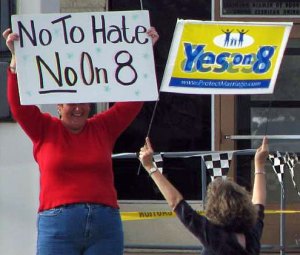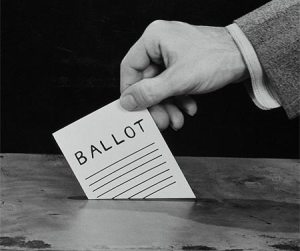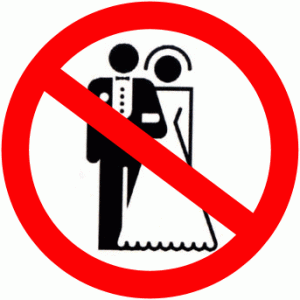 California Proposition 8, also known as the California Marriage Protection Act, was passed in 2008 as a state Constitutional Amendment recognizing only marriages between a man and a woman as being valid in the state of California. Being someone who lives in California, and specifically Los Angeles, I can assert safely that this ballet measure passing was more than a shock to most.
California Proposition 8, also known as the California Marriage Protection Act, was passed in 2008 as a state Constitutional Amendment recognizing only marriages between a man and a woman as being valid in the state of California. Being someone who lives in California, and specifically Los Angeles, I can assert safely that this ballet measure passing was more than a shock to most.
After all, California is supposed to be the leading example of all progressive legislation. Those here in the state purport the rest of the country looks to them for how the country will evolve and change.
California is a “Blue” state, therefore it’s largely Democratic, and if there’s one thing the Democrats love it’s democracy. That is, they love majority rule. They especially love it when they’re in the majority and they get their way, which is typically always, but in this instance they were shocked to see their democracy fail them as the majority votes stripped away the individual rights of the gay and lesbian community, and California was resigned to slink off into the western sunset as yet another state in the Union to ban same sex marriage.
It was a black-eye to their precious democracy.
Thomas Jefferson once proclaimed, “A democracy is nothing more than mob rule, where fifty-one percent of the people may take away the rights of the other forty-nine.” This was succinctly witnessed with the passing of proposition 8.
Since then, there have been a number of protests and lawsuits, and eventually the courts may very well repeal the terrible measure, but I have a solution for this today. Currently, people in opposition to Proposition 8 are arguing it to be a blatant violation of their fundamental rights, and they’re certainly correct, but they tend to be missing a very valuable perspective on marriage rights that could safely lead them to victory.
The real argument that should be made is against the government’s role in the institution of marriage itself. These “protect marriage” organizations that fund and support bans on same sex marriage use the representational government to engineer society in the image they prefer. Sound anything like fifty-one percent of the people telling the other forty-nine what to do?
 Whoever is in majority at a given time gets to dictate how everyone else should live their lives. Currently, “protect marriage” asshats are telling everyone that heterosexual couples can engage in marriage while gays and lesbians must sit in the back of the bus.
Whoever is in majority at a given time gets to dictate how everyone else should live their lives. Currently, “protect marriage” asshats are telling everyone that heterosexual couples can engage in marriage while gays and lesbians must sit in the back of the bus.
When these asshats profess a need to protect the “institution” of marriage, you must ask what that institution could be and why it needs to be protected. Also, why does the institution demand only heterosexual marriages? If you ask these questions often enough, the great Wizard of Oz will be reduced to the man behind the curtain, and all the pious obfuscations will be swept aside as the face of religious fundamentalism is revealed.
What is marriage? Some claim it can be a civil institution where two adults enter into a contract with the government that binds them by responsibility to one another and their children. If it truly is simply and only a social union or legal contract to create kinship between individuals, then the sex of the individuals would be incidental. We don’t stop gays and lesbians from entering into other types of contracts and unions, so why marriage specifically if not to charter in a fundamentalist designed society where marriage is a construct of the biblical creation of man. You know, as in, “Hey, it’s Adam and Eve! It ain’t Adam and Steve!”
What is marriage if not a religious institution?
 If it is a religious institution, then that’s all well and good. Churches have their rights, too, you know? If they want to conduct religious marriages recognized by the church, then by all means they should have the right to do so. But when the government is regulating and legislating these “sacred marriages”, then we’ve got a major problem where separation of church and state no longer applies. Simply put, if marriage is a religious institution, which it is, then the government shouldn’t be involved, and marriage should remain a matter of the church and not one of the state.
If it is a religious institution, then that’s all well and good. Churches have their rights, too, you know? If they want to conduct religious marriages recognized by the church, then by all means they should have the right to do so. But when the government is regulating and legislating these “sacred marriages”, then we’ve got a major problem where separation of church and state no longer applies. Simply put, if marriage is a religious institution, which it is, then the government shouldn’t be involved, and marriage should remain a matter of the church and not one of the state.
So my answer is simple. Abolish federally and state recognized marriages altogether. Think about it critically for a moment. Why the hell does the government need to know whether you’re married or not? Some would argue because there are kids involved therefore marriages need state and federal oversight, which is silly because kids are not a product of marriage but a product of sex. A magical stork doesn’t deliver you children when you take your vows. In fact, I could easily have children outside of wedlock as many couples do, so should the government also regulate dating? What if you had to get a dating license before you could take that pretty thing from accounting out to dinner?
Others would argue marriage is necessary to decide who makes medical decisions for hurt family members in the hospital and inheritance in one’s death. I would argue both could be taken care of by a simple contract, much like a legal will. If hospitals require proof of kinship to make medical decisions, shouldn’t the two adults agree upon that individually without the mandatory auspices of the government? Shouldn’t they have the right to draw a notarized contract for just such an occasion? Must they get a license and sign that very contract with the government?
I really cannot see any benefit for having government regulate, legislate and recognize marriages. Even the tax incentives they give to married couples are unfair and a big middle finger to those who choose not to marry. To me it all smacks of social engineering, and routinely we’re quick to defend the position of marriage because we’ve had certain traditions taught, spanked and preached into us our entire childhood that are difficult to shake free from.
If you take a critical perspective on marriage, I think everyone could agree it’s something that should be left up to the individuals and not to the interpretation of the many.
No comments:
Post a Comment